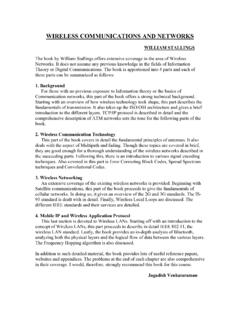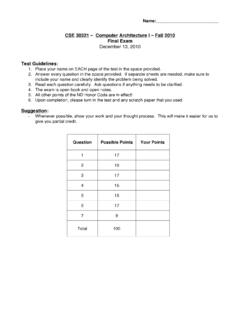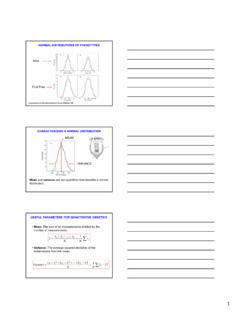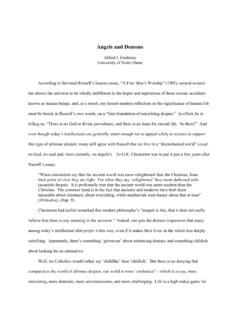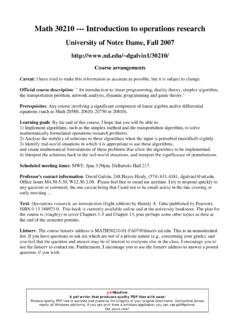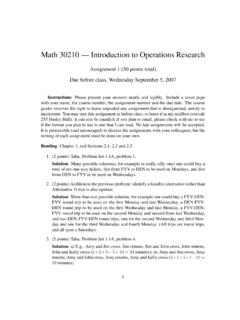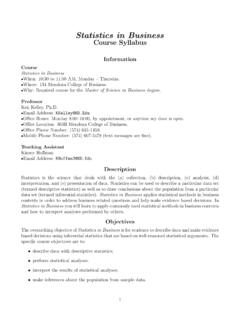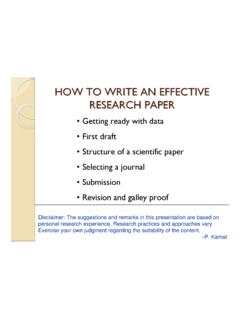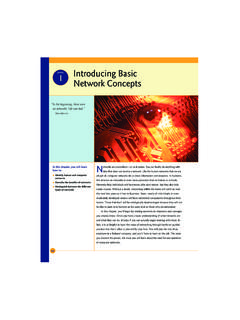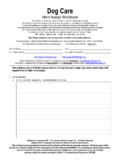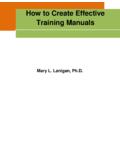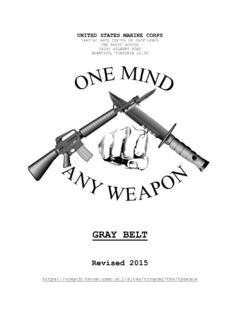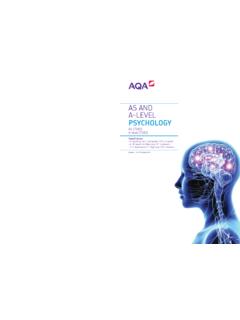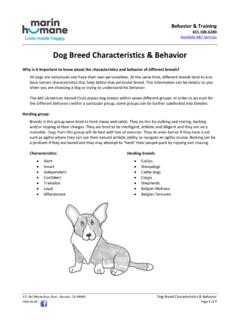Transcription of Ethical and Moral Leadership in the Military
1 356 Ethical and Moral Leadership in the MilitaryActivity Statement: View the movie Saving Private Ryan and discuss the importance of morals and ethics for Military Lesson Objective: Value the importance of morals and ethics for Military Samples of Behavior: Explain how an officer s responsibilities establish their priorities for making decisions. Defend why unlawful orders must be disobeyed. Defend the need to recognize and ignore illegal/immoral orders. Describe the Ethical dilemmas imposed during war/conflict.
2 Describe the Ethical issues surrounding killing prisoners of war/enemies. Actively participate in classroom discussion regarding Ethical considerations in war. Ethical and Moral Leadership in the Military 357 356 ETHICS THEORY FOR THE MILITARYPROFESSIONALC haplain (Col) Samuel D. MaloneyAdapted from Air University Review 32, no. 3 (March-April 1981)The United States is increasingly concerned with ethics. More professors are teaching courses in ethics and more students are studying ethics than ever before.
3 Incidents in Vietnam and Washington have reminded us that people in all walks of life are vulnerable to doing what is wrong. Professional groups lawyers, doctors, teachers, engineers, business managers, and others are structuring codes of ethics for their members. Throughout the past decade, Military professionals at the service academies and educational centers have shown increasing interest in the study of Ethical principles. Most officer training schools now include at least an elective on professional ethics, in which officers are encouraged to construct codes of ethics for the Military service.
4 Perhaps we are realizing that right and wrong may differ from common practice, majority opinion, or what the system will tolerate. Perhaps we as a nation are beginning to see the fallacies in the Ethical relativism of doing your own thing. We may even be ready to acknowledge the complexity of Ethical decision making and move beyond the dominating principle of personal or public happiness. Some of us are ready to assert that, in addition to such preeminent values as beneficence and justice, Ethical behavior also involves past commitments, present relationships, and future article will probe some of the complexities of acting ethically within the Military system.
5 I propose to direct your thinking in three ways: (1) to identify the fundamental pressures that are upon us all, that is, the Ethical bases or theories to which we are responsive; (2) to highlight the importance of certain areas where Ethical problems abound; and (3) to reaffirm some basic principles to guide COMPLEX Ethical PRESSURESThe complex Ethical pressures upon the Military professional are the rules, goals, and situations that provide the context and criteria for determining what is right and wrong, good and bad. The moment of decision making or action taking for the Military professional is crowded with signals emanating from rule-oriented obligations, goal oriented aspirations, and situation-oriented demands.
6 Each individual is responsible for juggling the Moral claims from these sources and for determining which signals merit Rule-Oriented ObligationsRules most commonly provide the primary criteria for Ethical judgments. The questions What ought I to do? and What is right for me to do? reflect not only a sense of obligation but also an awareness that a standard exists for establishing what is obligatory and what is right. Originally, these were religious questions referring to the will of God. They now have become questions for the citizen and Military personnel, more than most citizens, live under a sense of obligation, aligned with a strong base of order, obedience , and discipline.
7 We have taken oaths admitting us into the ranks of the Military . As officers we affirmed a commissioning vow. We swore to support and defend the Constitution of the United States. As citizens we are also obligated to honor constitutional justice, civil law, and the social and ethnic mores of our communities. The primary Ethical pressures upon us, however, are such formal mandates as telling the truth, keeping promises, respecting property, and preserving life. These constitutive or universal norms are the mortar without which social institutions would crumble.
8 While such norms need not be regarded as absolute Moral restrictions, the burden of proof is always upon those who would take exception to living has a long history in Western religions. The orthodox Jew, by the beginning of the Christian era, lived under an elaborate complex of conditioned and unconditional laws. The covenantal requirements of Mosaic Law consisted of 613 injunctions, 365 thou shalt not prohibitions and 248 thou shalt obligations. Far from burdensome, the Law clearly defined what God would have the believer do and not do; it provided the Moral framework for the Christian, law has been redefined as living in an obedient relationship with God through heeding the teachings of Jesus.
9 The Sermon on the Mount, the Ethical catechism of the early Church, and the Thomistic understanding of Moral law have provided a deontological* interpretation of morality. The pressure upon the Christian is not to be conformed to this world but to be transformed in order to prove what is the good and acceptable and perfect will of God (Romans 12:2).*As relating to the ethics of duty or Moral the followers of Islam are more rigidly fundamental than either Jews or Christians in their understanding of morality as obedience to a set code or to religious Leadership .
10 Islam means to submit, and a Muslim is one who has submitted. The Koran, the recited teachings of Muhammad, the Prophet of Islam defines the essential duties decreed by Allah and binds the believer to loyal subjection. The rule-oriented approach to Ethical theory establishes in given standards the criteria for determining right and wrong. Dilemmas exist when two or more obligations conflict. One must sometimes choose between what one believes God commands and what the state requires, between what a superior officer orders and what regulations prescribe, or between what law exacts and what personal conscience dictates.
